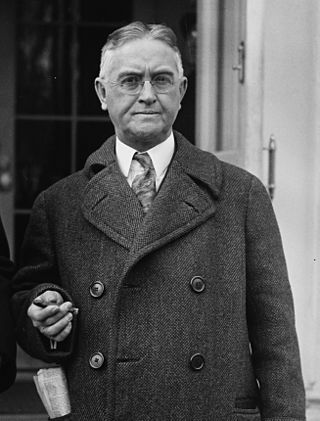
The 1924 Nebraska gubernatorial election was held on November 4, 1924, and featured former state Senator Adam McMullen, a Republican, defeating Democratic nominee, former state Representative John N. Norton, and Progressive nominee, Omaha City Commissioner Dan B. Butler.
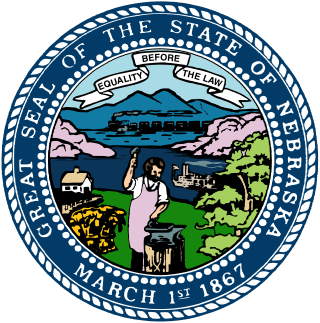
The 2022 Nebraska gubernatorial election took place on November 8, 2022, to elect the next governor of Nebraska. Incumbent Republican governor Pete Ricketts was term-limited and unable to seek a third term. In the general election, Republican Jim Pillen won the gubernatorial election by a 23-point margin.

The 1914 Nebraska gubernatorial election was held on November 3, 1914.

The 1912 Nebraska gubernatorial election was held on November 5, 1912.

The 1910 Nebraska gubernatorial election was held on November 8, 1910.
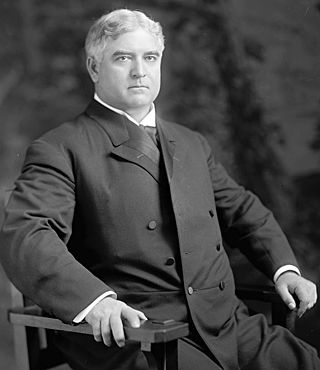
The 1908 Nebraska gubernatorial election was held on November 3, 1908.

The 1904 Nebraska gubernatorial election was held on November 8, 1904. Incumbent Republican Governor John H. Mickey won re-election to a second term, defeating Democratic and Populist fusion nominee George W. Berge with 49.67% of the vote.

The 1902 Nebraska gubernatorial election was held on November 4, 1902. Republican nominee John H. Mickey defeated Democratic and Populist fusion nominee William Henry Thompson with 49.69% of the vote.

The 1900 Nebraska gubernatorial election was held on November 6, 1900.

The 1898 Nebraska gubernatorial election was held on November 8, 1898. Incumbent Populist Governor Silas A. Holcomb did not stand for re-election. Populist and Democratic fusion nominee William A. Poynter defeated Republican nominee Monroe Hayward with 50.19% of the vote.
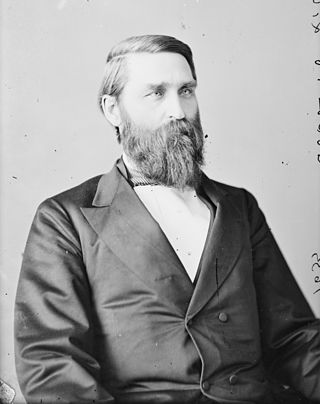
The 1892 Nebraska gubernatorial election was held on November 8, 1892. Incumbent Democratic Governor James E. Boyd did not seek re-election. Lorenzo Crounse, the Republican nominee, defeated both the Democratic nominee, J. Sterling Morton, and the Populist nominee, Charles Van Wyck.

The 1924 Nebraska lieutenant gubernatorial election was held on November 4, 1924, and featured Republican nominee George A. Williams defeating Democratic nominee P. J. Mullin as well as Progressive nominee Granville Hummer and Prohibition nominee J. F. Webster. Incumbent Nebraska Lieutenant Governor Fred G. Johnson, a Republican, chose not to seek reelection to the office of lieutenant governor in order to challenge George W. Norris for the Republican nomination for US Senate from Nebraska.

The 1922 Nebraska lieutenant gubernatorial election was held on November 7, 1922, and featured Republican nominee Fred G. Johnson defeating Democratic nominee P. J. Mullin as well as Progressive nominee T. J. Ellsberry. Incumbent Nebraska Lieutenant Governor Pelham A. Barrows, a Republican, chose not to seek reelection to the office of lieutenant governor in order to run for the vacant seat of C. Frank Reavis, former US Representative from Nebraska's 1st congressional district. Barrows was unsuccessful at obtaining the Republican nomination.

The 1886 Nebraska lieutenant gubernatorial election was held on November 2, 1886, and featured incumbent Nebraska Lieutenant Governor Hibbard H. Shedd, a Republican, defeating Democratic nominee Charles J. Bowlby as well as Prohibition Party nominee E. B. Graham and National Union Party nominee M. K. Lewis.

The 1888 Nebraska lieutenant gubernatorial election was held on November 6, 1888, and featured Republican nominee George de Rue Meiklejohn defeating Democratic nominee Frank Folda as well as Prohibition Party nominee John Dale and Union Labor nominee C. W. Potter.

The 1894 Nebraska lieutenant gubernatorial election was held on November 6, 1894, and featured Republican nominee Robert E. Moore defeating Populist and Democratic fusion nominee James N. Gaffin as well as Straight Democratic (anti-Populist) nominee Rodney E. Dunphy and Prohibition Party nominee Belle G. Bigelow.

The 1898 Nebraska lieutenant gubernatorial election was held on November 8, 1898, and featured Populist and Democratic fusion nominee Edward A. Gilbert defeating Republican nominee George A. Murphy as well as Prohibition nominee Newell S. Lowrie and Socialist Labor nominee J. J. Kerrigan.
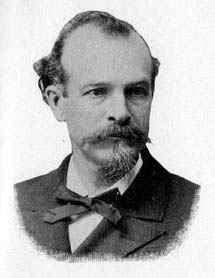
The 1900 Nebraska lieutenant gubernatorial election was held on November 6, 1900, and featured Republican nominee Ezra P. Savage defeating incumbent Nebraska Lieutenant Governor Edward A. Gilbert, the Populist and Democratic fusion nominee. Other candidates who received two percent of the vote or less included Prohibition nominee Charles R. Lawson, Midroad Populist nominee Herman G. Reiter, and Social Democratic nominee David McKibben.
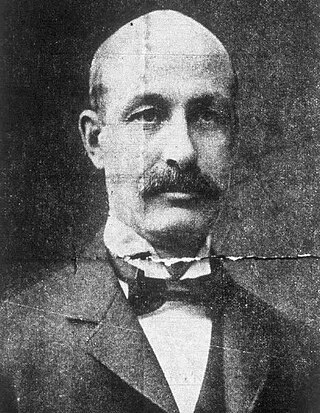
The 1904 Nebraska lieutenant gubernatorial election was held on November 8, 1904, and featured incumbent Nebraska Lieutenant Governor Edmund G. McGilton, a Republican, defeating Adelbert Townsend, the Populist and Democratic fusion nominee, as well as Prohibition nominee Isaiah Lightner and Socialist nominee Thomas Carroll.

The 1906 Nebraska lieutenant gubernatorial election was held on November 6, 1906, and featured Republican nominee Melville R. Hopewell, defeating William H. Green, the Democratic and Populist fusion nominee, as well as Prohibition nominee J. D. Forsythe and Socialist nominee C. A. Howe.
















